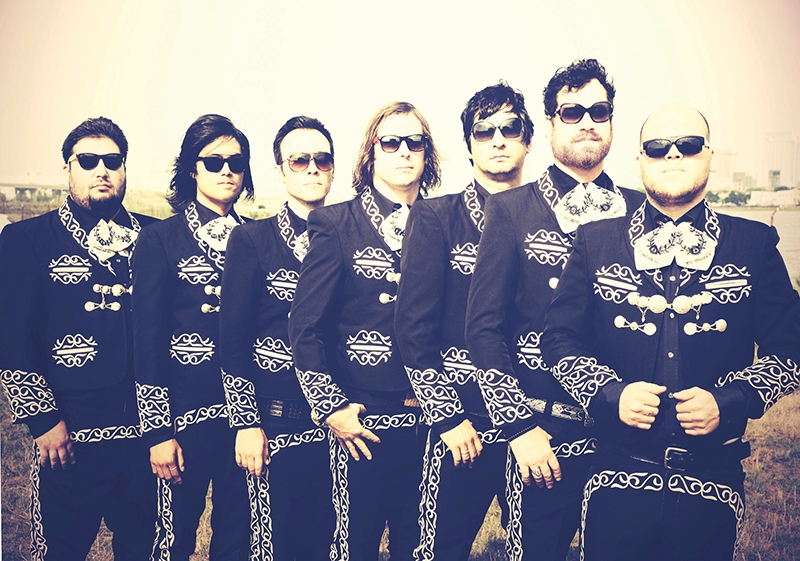Mariachi El Bronx: A Cleverly Disguised Rock Band
Music Interviews
When it comes to long-running bands, side projects are an inevitability. Lead singers will want even more attention and take up the acoustic guitar. Aging hipsters will start producing mash-ups to prove that they can still identify with the kids. Jaded bassists will start ambient noise projects to represent their turmoil. All the while, fans clamor for their favorite musicians to just get over themselves and get back to doing what they do best. But sometimes, a side project can take on a life of its own. Such is the case with Mariachi El Bronx. The offshoot of the LA punk band, The Bronx, initially began when the group was asked to perform a song acoustically for a TV appearance. Rather than taking the easy route, they came up with a mariachi arrangement of the song and unwittingly began the next chapter of the band’s existence. SLUG spoke with guitarist Joby Ford about the band’s connection to mariachi music and just how punk rock that connection can be.
SLUG: How did you first become interested in mariachi and traditional Mexican music?
Ford: The sound has always been something that I’ve been really drawn to. It has always taken me someplace, much like punk or classical music—it all changes my state of mind. Anytime that you’re in a creative situation making the same thing over and over and over, things get redundant, and this was an outlet that made a lot of sense to us. It just kind of happened. It started as a whim and turned into something that we’re really doing.
SLUG: A lot of listeners may not realize this, but Mariachi El Bronx implements multiple styles of Latin music into their sound, including mariachi, cumbia, norteño and more. How much did you cultivate your taste in the different styles of this music?
Ford: It’s a lot like getting into punk when I was a kid—there’s East Coast, West Coast, British—all these different facets to what, on the outside, seems to be something that all sounds the same. If you were to take a mariachi aficionado and play them Black Flag and then Metallica, they would probably say it all sounds the same, but to the people who can divulge and divide music into genres and borders, it’s a little more complex. I would hesitate to call us a mariachi band. I think we’re a cleverly disguised rock band. I really want to be as fluent as possible in all the different genres of something that I put myself in the middle of. It’s fascinating to me. The way they look at music is not based on the way you’re playing, but on how you can dance to it. I thought that was really fantastic. They approach it from a very different aspect than rock or punk. You’ve gotta stick within your boundaries for the style of music you’re making.
SLUG: How do you think punk rock and mariachi are culturally differentiated?
Ford: No one is creating new music in [mariachi]—it’s a lot like classical music where it’s all these traditional songs, and it’s kind of like a contest between the groups about who can play the songs better. I grew up studying classical piano, and it’s not really a creative outlet, it’s more of a discipline. Discovering the electric guitar at a young age all of a sudden put me into a situation where there were no rules.
SLUG: Mariachi El Bronx has had a lot of exposure via tours with big bands such as The Killers and The Foo Fighters. Have you seen any sort of negative reaction from fans of punk rock, the fanbases of these bigger bands you’ve been opening for or even fans of mariachi music?
Ford: In anything you do where you’re being creative and doing something different, there are a lot of people who can’t wrap their heads around it and think that you suck, and there are other people who love that you’re taking a genre and you’re pushing it further—especially in a genre where there typically isn’t a “taking things further” in a creative aspect. Everybody quips and qualms about how much they hate these big bands, but in playing music, and in the spirit of punk, preaching to the choir is pointless. The real shit is when you’re out there in front of people who don’t want to hear you and are confused by what you’re doing and can’t wait for you to finish so they can see their favorite headlining radio act. It feels good. It feels like a fight.
SLUG: The Bronx just relesed Bronx IV. Do you think spending such a long time as Mariachi El Bronx and recording two albums in that incarnation of the band has impacted your musical style as The Bronx?
Ford: Oh, definitely. Whether you like it or not, every single thing you do in your daily routine impacts your creative process. There are songs that are slow as fuck on that record—we never would’ve played those before. But now we think they’re great songs.
Since their formation, Mariachi El Bronx have recorded two albums, appeared on various late night talk shows, landed numerous festival spots and opened for some of the biggest bands in the world on arena tours. Clearly, these guys are onto something. Join the fight for true punk rock as Mariachi El Bronx opens for Flogging Molly March 15 at The Great Saltair.
